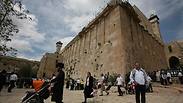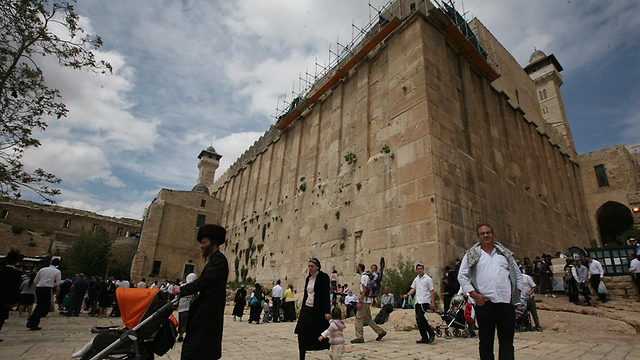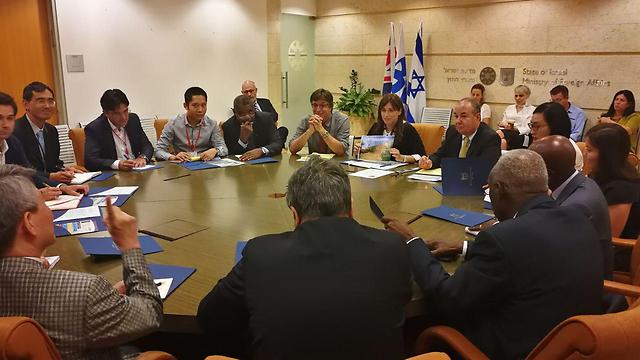
Cave of the Patriarchs
צילום: גיל יוחנן
Israel pushes for secret ballot in UNESCO vote on Hebron
With at least one country that doesn't have diplomatic ties with Israel signaling it is willing to vote against PA request to recognize Hebron's Old City—and with it the Cave of the Patriarchs—as a Palestinian World Heritage Site, Israeli ambassador is pushing for a true secret ballot vote.
Israel is trying to convince the UNESCO World Heritage Committee to hold a secret ballot vote on a request by the Palestinians to recognize Hebron's Old City—and with it the Cave of the Patriarchs—as a Palestinian world heritage site.
This, Israeli officials hope, would help foil the Palestinian move.
The default for the vote, which is set to take place July 1 in Kraków, is a public vote, but the rules of procedure allow for a secret ballot vote whenever two or more state members request it.
There are 1,052 UNESCO-listed World Heritage Sites in the world, nine of them Israeli, two of them Palestinian. The registration process and declaration of each site usually takes a number of years, but the PA want to take advantage of a clause in the regulations that allows to fast-track this procedure by claiming the sites are endangered.
The PA claims that the site is in danger of destruction by the "occupying force." Among other things, they claim that Israel carried out an exceptionally large concrete casting at the site, while Israel claims that it is only a small addition to the site, and that it was coordinated with the Jerusalem Islamic Waqf.
The Heritage Committee has 21 member countries, and its composition is very problematic for Israel: Finland, Poland, Portugal, Croatia, Turkey, Azerbaijan, Indonesia, Philippines, Korea, Vietnam, Kazakhstan, Tunisia, Kuwait, Lebanon, Burkina Faso, Zimbabwe, Angola and Tanzania—none of which is among the ten countries that voted in favor of Israel at the UNESCO Executive Committee concerning Israeli conduct in Jerusalem and Gaza.
The battle for Hebron is therefore expected to be a close one, with the decision expected to be determined by one vote. Expected voting patterns show a secret ballot could have a critical impact on the vote. At least one country that does not have diplomatic ties with Israel has signaled it would vote against the Palestinians in a secret ballot vote.
Israel's Ambassador to UNESCO Carmel Shama-Hacohen and his deputy have already approached key officials in the organization, including its legal advisor, in an effort to ensure a true secret ballot vote.
Israel has asked that the entire voting process—from receiving the ballot, through marking the vote and putting it into an envelope—will be done in secret. It has been customary in UNESCO for a clerk to hand out ballots to the ambassadors at their seats, with them marking their vote in the open, where all could see.
However, with only a few days to the vote, UNESCO is having difficulties ensuring a fair vote, with Arab nations pressuring the organization. Meanwhile the rules of procedure do not point to a position holder to whom Israel can petition on the matter.
The recognition of the Old City of Hebron as a UNESCO World Heritage Site would serve to cement international views that see the Cave of the Patriarchs a Muslim, Palestinian site. In a broader sense, such recognition would also impact the question of sovereignty and historical rights over other sites the Palestinians are claiming.
Such recognition would also put limitations on Israeli construction, preservation and development of the site and an area around it. For any security checkpoint set up or works done by Israel at the site, it would be accused of the destruction of a World Heritage Site.
The Palestinians would also be able to gain from the boost in tourism that World Heritage sites normally get.
"The issue of a secret ballot vote is critical," said Ambassador Shama-Hacohen. "It's very sad that this isn't a given, and that we have to fight for it. The undemocratic gang that has hijacked the organization's agenda is now trying to force its wishes on the rules of procedure. It is obvious to any child in a democratic nation that a true secret ballot is when only the voter can see his choice and cannot show it to others even if he wants to."
He went on to say that "If the Palestinians are worried about losing the vote, it would be far more honorable for them to pull their request and postpone the vote than try to steal it."
He added that "the essence behind the Palestinians' request is stealing heritage, history and culture from Judaism and Christianity. Now they're trying to add insult to injury by putting a stamp of approval on the theft by stealing the vote."












